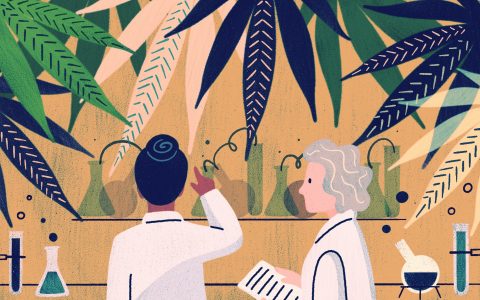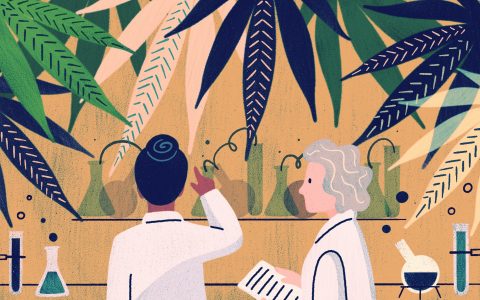BERKELEY, CA — One of the nation’s premier learning institutions is bear-hugging the once-feared cannabis plant like never before.
A newly formed Cannabis Research Center at UC Berkeley launched Tuesday night. The center could be the beginning of something huge in academia, said co-director Van Butsic, who has a Ph.D in forestry, and is studying cannabis farming and water use in 2019.
Butsic said researchers all across the university are performing or proposing cannabis-related studies. The Cannabis Center hopes to catalyze those elements to boost grant funding and publish major findings in leading journals—the dual fuels of academic success.
Dominic Corva, Ph.D, founder, executive director, Center for the Study of Cannabis and Social Policy
Cal’s number one rank among among public universities bestows unprecedented credibility on the burgeoning field of cannabis studies. Tuesday night’s private reception took place on the top floor of the Barrows science building overlooking the school’s famed campanile. A wine and cheese reception followed a panel talk.
The panel discussion included: Richard Parrott of farming regulator CalCannabis; Joanna Cedar from major producer CannaCraft; Patricia Brooks, cannabis advisor to Alameda County Supervisor Nate Miley; longtime advocate Kristin Nevedal of the Nevedal Group; and Stephen DeAngelo, founder of Oakland’s biggest retailer Harborside.
In the audience were more than 50 guests including cannabis research all-stars Amanda Reiman, who has a doctorate in social welfare; Dominic Corva from the Center for the Study of Cannabis and Social Policy in Washington state; and Cal post-doctoral fellow Michael Polson.
This first year, the Cal Cannabis Center maps the barriers to entry for cannabis farmers and determines farm water use. Many more grant applications should follow.
“It’s great the UC system is coming along with this stuff,” Corva said. “This really opens things up. We really should be so much further ahead in our ability to gather data, analyze it, and get it out there. This will get us over the hump.”
A New Epoch In Academia
A small grant from the UC Berkeley Social Science Matrix pays for this year’s Cannabis Center. Butsic said that’s a world of difference from even a few years ago, when he asked about applying for cannabis research grant money.
“They said, ‘Don’t even bother to apply.’ And now, how things have changed,” he said.
One in five Americans lives in an adult-use legalization state. The US cannabis economy might total $40 billion in illicit and licit annual sales.
Until recently, institutional bias against cannabis plagued academia, which mostly relies on federal funding. The vast majority of cannabis research funding comes from the National Institutes of Health (NIH), signed off by the National Institute on Drug Abuse (NIDA). NIDA has a congressional mandate to seek evidence only of cannabis’ harms, not its benefits.
Reiman gave the example of the National Survey on Drug Use and Health (NSDUH), which prevented respondents from supporting legalization. The NSDUH survey asked a cannabis legalization question where the answers were either, “strongly oppose,” “oppose,” or “neutral.”
This type of obvious bias “pushed away so many brilliant people,” said Reiman, who got her Ph.D. from Cal in 2006. “You lose really smart people or you jade them. We all knew the way the game was being played.”
Today, legal cannabis taxes fund unbiased research grants in multiple states — including UC San Diego‘s work on medical marijuana, as well as traffic safety. Plant biology and ecology researchers can also tap new grants from more traditional sources, such as the National Science Foundation. Northern Michigan University now offers a “Medical Plant Chemistry” degree for cannabis.
Alameda County’s Patricia Brooks said solid data on cannabis’ environmental or economic impact will buttress future policy discussions. “We need to have clean data so we have a baseline of credibility moving forward.”
Nevedal represents small outdoor farmers and said she was amazed to see Cal level up its cannabis research game. “This is kind of a dream,” she said.
Cannabis Research Starts At The Farm
Butsic’s focus on cannabis farmers’ barriers to entering the legal market is especially timely.
Parrott, the lead state regulator at CalCannabis, which oversees growers, noted cannabis is the only agricultural crop subject to state licensing. “You don’t need a license to farm tomatoes, you just plant them.”
As a result of state licensing, cannabis farms are subject to tough environmental standards under the state’s environmental quality act (CEQA) that no other farms face.
NIMBYs have long abused CEQA as a cudgel to kill local development in California. That reality has now come to cannabis.
Both cities and the state of California will face NIMBY lawsuits over cannabis that invoke CEQA this year, it seems. CEQA reviews are the number one thing slowing down annual farm licensing in California, Parrott said.
These kinds of regulatory hurdles are “devastating to this community,” said DeAngelo, who has seen his 3,000-grower supplier roster shrink to 25 distributors in 2018.
The launch of Cal’s Cannabis Research Center follows a very popular Science of Cannabis public symposium in 2018 produced by the school’s Botanical Garden.















